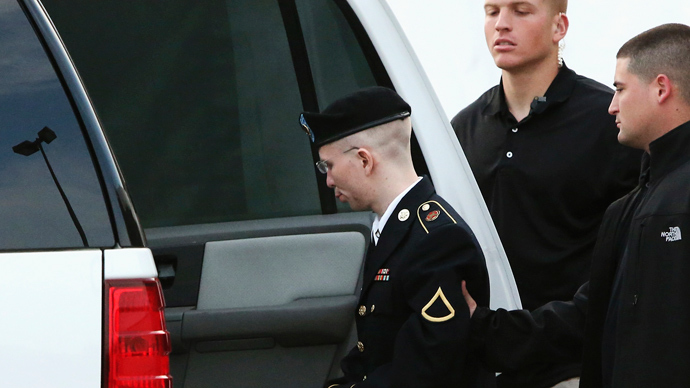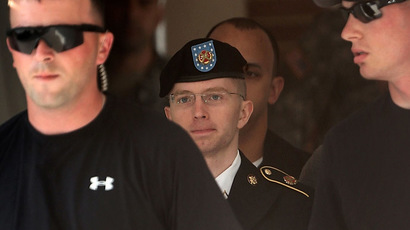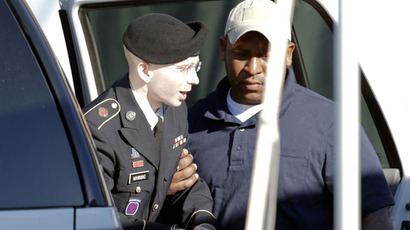Defense rests in Bradley Manning case

Attorneys for Army Private first class Bradley Manning rested their case Wednesday afternoon after the prosecution cross-examined the defense’s tenth and final witness.
The soldier’s court-martial is now recessed until next week, at which point government prosecutors plan to offer a rebuttal. Col. Denise Lind, the presiding military judge in the case, also is expected to weigh in next week on the defense’s recent request that the government acquit Pfc. Manning on four of the more than 20 counts he has been charged with, including aiding the enemy.
Manning’s trial is expected to conclude next month and could end with Col. Lind sentencing the soldier to life in prison if she convicts him of aiding the enemy, a charge the government has accused the defendant of because Manning willingly sent classified documents to the anti-secrecy website WikiLeaks while deployed as an Army intelligence analyst in Iraq. He was arrested in April 2010 and admitted earlier this year to what is largely regarded as the largest intel leak in United States history.
During Wednesday’s hearing, however, Harvard Law professor Yochai Benkler testified that WikiLeaks was at first never regarded as an organization that could be assisting terrorists, as the prosecution alleges. Only after Manning’s relationship with the site was already established in 2010, he said, did the government begin developing that argument.
Benkler previously taught Internet law and policy at New York University and later Yale before his tenure with Harvard began in 2007, and was called on by the defense as an expert witness on “the network Fourth Estate,” which he described as “the set of practices [and] organizing models technologies that together come to fill the role that in the twentieth century we associated with the free press.”
“The network Fourth Estate is essentially the cluster of practices and technologies and organizations that fill that role in the twenty-first century model of network information production,” he said. “Mostly it refers to journalism when we're talking about its role in the construction of democracy, more on the watchdog function specifically around the more broadly journalism.”
David Coombs, Manning’s civilian defense attorney, relied on
questioning Benkler into the afternoon “to specifically
testify about how WikiLeaks fits within the network Fourth
Estate.” Additionally, Coombs tried to persuade Col. Lind
that the government’s accusation that Manning aided the enemy is
invalid since former al-Qaeda leader Osama bin Laden did not
request material published by WikiLeaks until after the US
government and the media began demonizing the whistleblower
website.
“The Defense's position is that rebuts the idea that the enemy would use WikiLeaks as a source of intelligence initially prior to these leaks because what happens is, essentially after these leaks start to happen, the government rhetoric against WikiLeaks makes them appear to be an enemy,” Coombs told the court. “And that, that rhetoric is what drives the enemy to actually go look at WikiLeaks, not the actual publication of the information.”
“That type of argument has only been advanced after the March 2010 time period,” Coombs said, roughly four months after Pfc. Manning began sharing documents with WikiLeaks and only weeks before his arrest.
“That whole train of thought is created really after March of 2010. It's created by big government and how they reacted to the releases in this case and how they reacted and Professor Benkler will testify how they reacted in a very uneven-handed manner where you have other organizations like the New York Times, like The Guardian, like Der Spiegel, publishing the same information and yet the diatribe coming from the government was not aimed at them, it was aimed at WikiLeaks.”
“The government's whole argument seems to be premised on creating WikiLeaks as a bad organization,” Coombs said.
Previously, the prosecution admitted that they would have charged The Times with aiding the enemy had Manning went to them first. Prof. Benkler all but equated WikiLeaks as the same time of entity, though, calling the website “an organization that fulfilled a discrete role in network journalism of providing a network solution to leak-based investigative journalism that in the past was done only by relatively large and unified organizations and now could be done in a network mode.”
When Coombs asked his witness if WikiLeaks fits in with the idea of a journalist organization, Bankler replied, “Yes, absolutely,” and acknowledged that government-affiliated newspapers and even then-Sen. Joe Lieberman celebrated the site.
“They created what was essentially a safe platform for people who were close to the materials, who had knowledge on the inside to leak materials for public revelation and the platform was intended both to provide secrecy and security for the person leaking and to provide a mechanism for some level of authentication of the voracity of the documents before they were placed online and in the ideal model also a place for people to comment on the materials after they were made online,” Bernkler said of WikiLeaks.
Bernkler added that nothing prior to April of 2010 connected the website with a terrorist organization, but things shifted later that year after they began publishing field reports from the Iraq War that were leaked by Manning.
“The Defense's position on this is that anyone looking at WikiLeaks,” prior to April 2010, said Coombs, “would have viewed WikiLeaks as a legitimate news organization. Additionally, the Defense's position is that the enemy went to get this information only after the government's responses to the leaks and that's what prompted them.”
“So from the Defense's position this not only rebuts the idea that Pfc. Manning would have had any actual knowledge” that he’d be aiding al-Qaeda by leaking documents, but also “rebuts the idea of any wanting conduct by PFC Manning by choosing to release information to a legitimate news organization.”
“The actual release of that information was wrongful and he's accepted responsibility for that,” said Coombs. “But it was not wanton.”
Coombs concluded the defense’s case Wednesday afternoon after calling his tenth and final witness. Previously, the prosecution relied on testimonies from over 80 individuals to help get their point across to the court.
Quotes attributed to Coombs and Benkler used in this article come courtesy of the Freedom of the Press Foundation, which has so far raised over $90,000 to hire the courtroom stenographers who’ve created the only verbatim record of the case that’s publically available.














